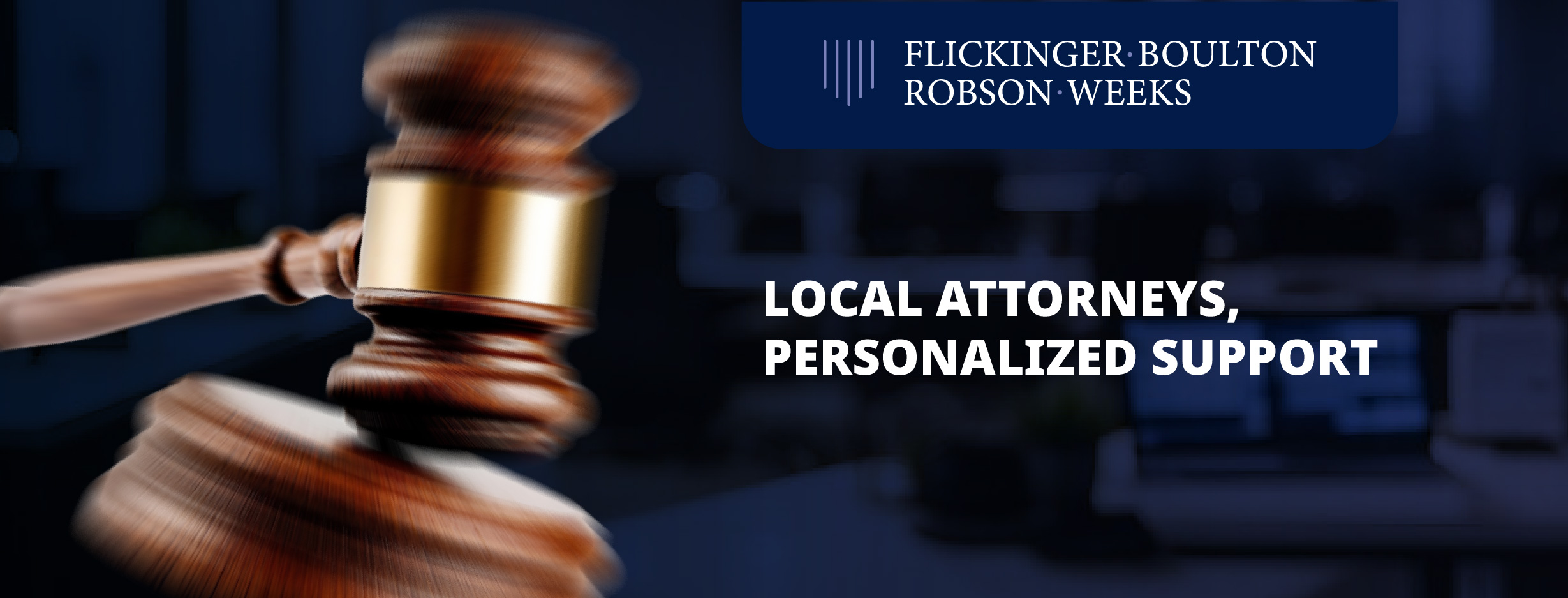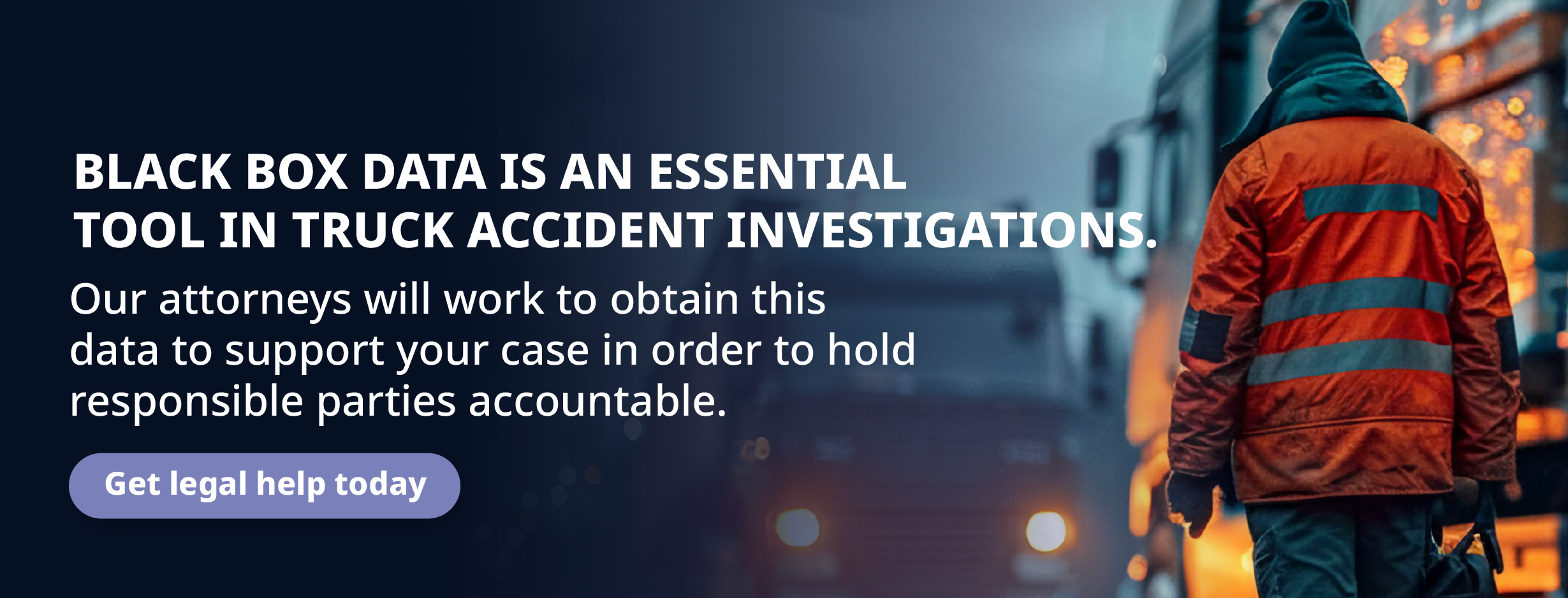Determining what happened and who is responsible can be challenging when a truck accident occurs, especially when insurance companies and trucking companies dispute liability.
One of the most valuable pieces of evidence in truck accident investigations is data from the truck’s black box. These devices record critical driving data, including speed, braking patterns, steering inputs, and hours of service, which can provide key insights into the cause of a crash.
At Flickinger Boulton Robson Weeks, our Sandy truck accident lawyers understand how to retrieve, analyze, and use black box data to build a strong case for accident victims. This information can reveal whether a truck driver was speeding, failed to brake in time, or violated federal trucking regulations, helping to establish liability and secure rightful compensation.
If you or a loved one has been injured in a truck accident in Sandy, we can help obtain black box data and use it to strengthen your claim. Contact us today to learn more about how we can assist you.
A truck’s black box, also known as an Electronic Control Module or Event Data Recorder, is a device installed in most commercial trucks that collects and stores critical driving data. Similar to the black boxes used in airplanes, these devices provide detailed information about the truck’s performance, driver behavior, and vehicle operations before, during, and after an accident.
Black box data is one of the most valuable pieces of evidence in truck accident investigations, as it can help determine the cause of a crash and establish liability.
Black boxes in commercial trucks continuously record and store data, which can be crucial evidence for accident cases. Some of the most important types of data collected include:

Black box data is a powerful tool for determining fault in truck accident cases. Insurance companies and trucking companies often dispute liability, but the role of black box data is to provide an objective record of what happened, and if the truck’s functioning had anything to do with it. Attorneys and accident reconstruction experts analyze this data to:
Although black box data is critical evidence, it is often controlled by the trucking company, which may attempt to delete or withhold information that could prove their driver was at fault. This is why it is essential to act quickly after a truck accident.
An experienced Sandy truck accident lawyer at Flickinger Boulton Robson Weeks can issue a legal demand to preserve black box data before it is erased or tampered with.
A truck’s black box is a key piece of evidence in determining liability in truck accident cases. It provides accurate, real-time data that can reveal driver errors, violations of federal trucking laws, and mechanical issues that may have contributed to the crash.
If you’ve been injured in a truck accident in Sandy, our legal team at Flickinger Boulton Robson Weeks can help retrieve and analyze black box data to build a strong case. Contact us today for a free consultation.
A truck’s black box records a wealth of critical driving data that can help determine the cause of an accident and establish liability.
This data is essential for truck accident investigations, as it provides an objective record of the vehicle’s performance and the driver’s actions before and during a crash.
Understanding the types of data recorded by black boxes and their importance can help accident victims build a strong legal case.

Black boxes in commercial trucks collect and store various types of data that are crucial in analyzing accident causes. Some of the most important data recorded include:
The data recorded by a truck’s black box is crucial evidence in truck accident claims because it provides objective, real-time insights into how the crash occurred. Unlike witness statements or driver testimony, which can be biased or inaccurate, black box data is a scientific record that can:
Because trucking companies control access to black box data, they may attempt to delete or withhold information that proves liability. This is why accident victims must act quickly and consult a Sandy truck accident lawyer at Flickinger Boulton Robson Weeks, who can secure and analyze this vital evidence. Contact us today for a free consultation.

Black box data plays a critical role in truck accident investigations, but obtaining and utilizing this evidence can be challenging. Unlike passenger vehicles, where owners may have access to the data, black box data in commercial trucks is usually owned and controlled by the trucking company.
Because this data can serve as key evidence in determining liability, trucking companies and their insurers may attempt to delay, alter, or destroy the information to protect themselves from legal claims. Understanding the legal considerations for accessing black box data is essential for truck accident victims seeking justice.
Unlike in a personal vehicle, where the owner has direct access to their car’s event data recorder, black box data in a commercial truck is the property of the trucking company or vehicle owner. This means that after an accident, victims and their legal representatives do not automatically have the right to access the black box. Instead, a formal legal process is often required to obtain this data.
One of the biggest challenges in using black box data is ensuring it is preserved. Many trucking companies delete or overwrite black box data after a certain period, sometimes within weeks of an accident. If a trucking company believes the data could be damaging to their case, they may attempt to erase or tamper with it before it can be retrieved.
To prevent this, a legal document called a spoliation letter must be sent to the trucking company as soon as possible after the accident. This letter formally demands that the company preserve all relevant evidence, including black box data, driver logs, and maintenance records.
If a trucking company destroys or fails to preserve evidence after receiving this notice, they may face legal consequences that could strengthen the victim’s case.
Accessing black box data typically requires legal action. A truck accident lawyer can:
Once obtained, black box data serves as critical evidence in proving fault in a truck accident case. This data can be used to establish whether the truck driver or trucking company violated safety regulations, helping victims pursue maximum compensation for their injuries.
Because black box data provides an unbiased, scientific record of the truck’s actions, it can be more reliable than witness statements or driver testimony, which can sometimes be misleading or inaccurate.
Black box data is especially valuable when:
Because insurance and trucking companies often try to undermine or dismiss black box evidence, accident victims need skilled legal representation to ensure the data is used effectively in negotiations or at trial. At Flickinger Boulton Robson Weeks, we work diligently to analyze black box records and build a compelling case for our clients. Contact us today to learn how we can help.
At Flickinger Boulton Robson Weeks, we are dedicated to protecting the rights of truck accident victims in Sandy and ensuring they receive the justice and compensation they deserve.
Truck accident cases are often complex, involving powerful trucking companies and aggressive insurers, but our experienced legal team is prepared to fight for you every step of the way.
Whether your accident was caused by driver negligence, regulatory violations, or mechanical failure, our Sandy truck accident lawyers will thoroughly investigate, gather critical evidence, and build a strong case on your behalf.
Don’t hesitate to take legal action; contact us today at (801) 500-4000 for a free consultation. Let us fight for your rights and help you secure the compensation you need to move forward.
Bicycle Accidents
Motorcycle Accidents
Boating Accidents
Recreational Vehicle Accidents
Bus and Mass Transit Accidents
Pedestrian Accidents
Automobile Accidents
ATV or UTV Rollovers
Commercial Vehicle Accidents
Semi Truck and Trailer Accidents
UTAH INJURY LAWYERS
Flickinger • Boulton
• Robson • Weeks
PROVO OFFICE
3000 N University Ave
Suite 300
Provo, UT 84604
SOUTH JORDAN OFFICE
10393 S. Temple Dr.
Suite 103
South Jordan, Utah 84095
OFFICE HOURS
Monday- Friday: 8AM-5PM
Saturday-Sunday: Closed
*Disclaimer: the information provided by this website is for informational purposes only and should not be considered legal advice or a substitute for competent legal counsel.
**SMS consent and contact phone numbers will not be shared or sold to third parties or their affiliates for any purpose.
© 2025 All Rights Reserved.